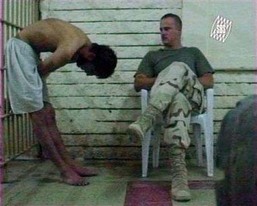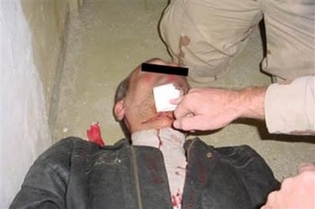The Iraq War
Abu Ghraib Prison Photos
April 28, 2004
Prior to the Iraqi war starting, President Bush released a statement that would start one of the war’s biggest scandals. Defense Secretary Donald Rumsfeild stated that Bush had said Geneva Convention rules do not apply terrorist detainees in Afghanistan. The Geneva Convention listed the Rules of Engagement which defined who, how and when soldiers are allowed fire upon the enemy. Because of this, during the Afghan war, two detainees died of blunt force injuries sustained from American interrogation; these were classified as homicides and went under investigation. A year later, in 2003 the Iraq war officially starts, and Reserve Brig. Gen. Janis Karpinski is named in charge of a military brigade responsible for guarding suspected terrorists. On July 23 Amnesty International revived several reports of Iraqi prisoners tortured, and in October the Red Cross runs a thorough investigation of the main prison, Abu Ghraib, and finds many violations. However Rumsfeld said he had not received these reports. Through October to December, Abu Ghraib became home to brutal interrogations and torturing. On November 26, Iraqi Maj. Gen. Abed Hamad Mowhoush was killed after losing consciousness during an interrogation. This started yet another investigation. The abuses and tortures continue for a while, until documentation and information begins to arise. On January 13, Army Spc. Joseph M. Darby left a disc containing horrid and brutal photographs of a prisoner abused on an investigators bed. Other photographs arise, documenting abuse, rape, beatings and other horrid acts in Abu Ghraib. Finally on January 31, Maj. Gen. Antonio Taguba starts an investigation of the prison. As a result 17 military personnel are suspended with six marines facing criminal charges. Later as photos begin to surface to the public and a huge outcry breaks out, the Bush administration appoints Maj. Gen. Geoffrey Miller, who ran an earlier interrogation, is now appointed to US-run Iraq prisons. Later on still more news and reports continue to surface and six more soldiers receive reprimands. Bush urges Donald Rumsfeld to punish all U.S. guilty in participating in the tortures. Finally on May 7th, Rumsfeld is called to testify and apologizes failure to inform the president. He admits that he was very lax in notifying both the president and congress. Overall the war crimes committed at Abu Ghraib become an international case study into how best handle interrogations and Prisoners of War (POWs). Rumsfeld as well as congress appoint a panel to review and change the operation of prison systems. Globally, the U.S.’s actions became nationally attacked, with many countries including Iraq demanding a change in the system. Overall this investigation lead to a global recognition over the exploits of war prisons.


